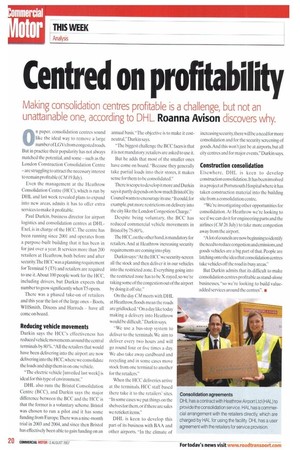Centred on profitability
Page 20

If you've noticed an error in this article please click here to report it so we can fix it.
Making consolidation centres profitable is a challenge, but not an unattainable one, according to DHL. Roanna Avison discovers why.
0 n paper. consolidation centres sound like the ideal way to remove a large number of LG Vs from congested roads. But in practice their popularity has not always matched the potential, and some such as the London Construction Consolidation Centre -are struggling to attract the necessary interest to remain profitable (CM 19 July).
Even the management at the Heathrow Consolidation Centre (HCC), which is run by DHL and last week revealed plans to expand into new areas, admits it has to offer extra services to make it profitable.
Paul Durkin, business director for airport logistics and consolidation centres at DHLExel, is in charge of the HCC. The centre has been running since 2001 and operates from a purpose-built building that it has been in for just over a year. It services more than 200 retailers at Heathrow. both before and after security.The HCC was a planning requirement for Terminal 5 (T5) and retailers are required to use it. About 100 people work for the HCC, including drivers, but Durkin expects that number to grow significantly when T5 opens.
There was a phased take-on of retailers and this year the last of the large ones Boots, WHSmith, Dixons and Harrods have all come on board.
Reducing vehicle movements
Durkin sass the HCC"s effectiveness has reduced vehicle movements around the central terminals by 80% ."All the retailers that would have been delivering into the airport are now delivering into the HCC. where we consolidate the loads and ship them in on one vehicle.
"The electric vehicle [unveiled last week] is ideal for this type of environment."
DHL also runs the Bristol Consolidation Centre (BCC), and Durkin says the major difference between the BCC and the HCC is that the former is a voluntary scheme. Bristol was chosen to run a pilot and it has some funding from Europe. There was a nine-month trial in 2003 and 2004, and since then Bristol has effectively been able to gain funding on an annual basis. "The objective is to make it costneutral," Durkin says.
"The biggest challenge the BCC faces is that it is not mandatory; retailers are asked to use it.
But he adds that most of the smaller ones have come on board. "Because they generally take partial loads into their stores, it makes sense for them to be consolidated."
There is scope to develop it more and Durkin says it partly depends on how much Bristol City Council wants to encourage its use."It could, for example, put more restrictions on delivery into the city like the London Congestion Charge."
Despite being voluntary, the BCC has reduced commercial vehicle movements in Bristol by 75-80%.
The HCC, on the other hand, is mandatory for retailers. And at Heathrow increasing security requirements are coming into play.
Durkin says:"At the HCC we security-screen all the stock and then deliver it in our vehicles into the restricted zone. Everything going into the restricted zone has to be X-rayed, so we're taking some of the congestion out of the airport by doing it off site.
On the day CM meets with DHL at Heathrow, floods mean the roads are gridlocked."On a day like today making a delivery into Heathrow would be difficult," Durkin says.
"We use a bus-stop system to deliver to the terminals. We aim to deliver every two hours and will go round four or five times a day. We also take away cardboard and recycling and in some cases move stock from one terminal to another for the retailers."
When the HCC deliveries arrive at the terminals. HCC staff based there take it to the retailers' sites. "In some cases we put things on the shelves for them, or if there are sales we reticket items."
DHL is keen to develop this part of its business with BAA and other airports. -In the climate of increasing security,there will be a need for more consolidation and for the security screening of goods.And this won't just be at airports. but all city centres and for major events," Durkin says.
Construction consolidation
Elsewhere. DHL is keen to develop construction consolidation. It has been involved in a project at Portsmouth Hospital where it has taken construction material into the building site from a consolidation centre.
"We're investigating other opportunities for consolidation. At Heathrow we're looking to see if we can do it for engineering parts and the airlines (CM 26 July) to take more congestion away from the airport.
-A lot of councils are now beginning to identify the need to reduce congestion and emissions,and goods vehicles are a big part of that. People are latching onto the idea that consolidation centres take vehicles off the road in busy areas."
But Durkin admits that its difficult to make consolidation centres profitable as stand-alone businesses, "so we're looking to build valueadded services around the centres". •






























































































































































































